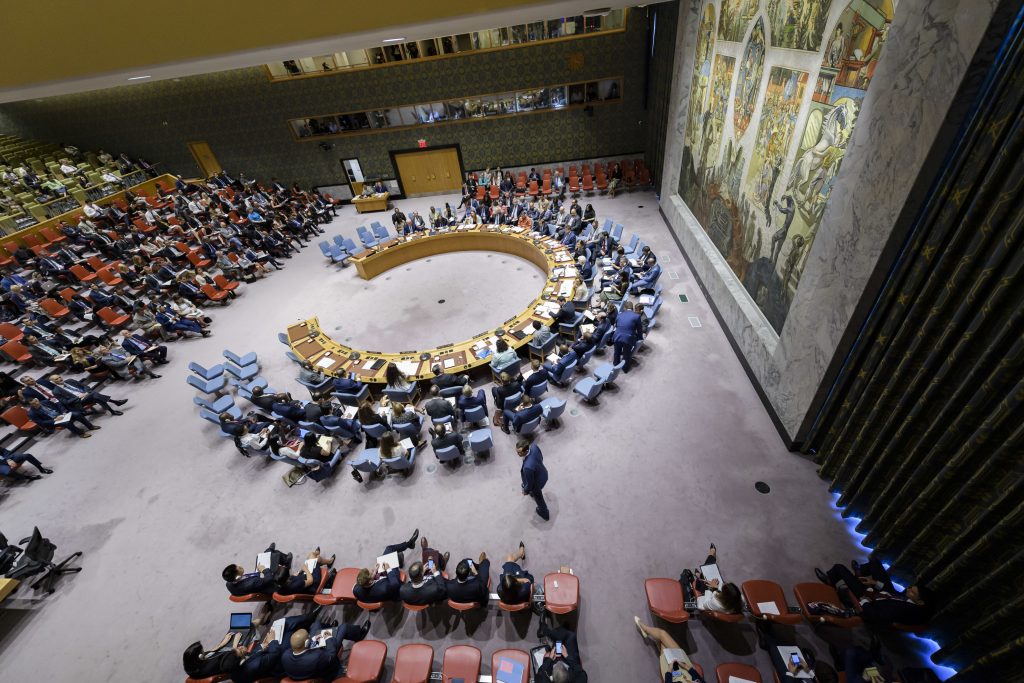Vetoed: UNSC resolution to protect Sudanese civilians

The UN Security Council (Photo: UN)
The United Nations Security Council failed to adopt a draft resolution aimed at pushing for measures to protect civilians in Sudan after Russia used its veto power to reject it. The draft was submitted by Sierra Leone and the United Kingdom, which is currently the penholder of the Sudan file.
The session was chaired by UK Foreign Secretary David Lammy, whose country chairs the Security Council (UNSC) sessions this November.
The session was adjourned for 15 minutes before the start of the vote, at the request of France, in a last-ditch attempt to reach a compromise that would prevent Russia, a permanent council member, from using its veto.
14 countries voted in favour of the draft resolution calling on the Sudanese Armed Forces (SAF) and the Rapid Support Forces (RSF) to fulfil and fully implement their obligations in the Jeddah Declaration, signed by the two parties to the conflict in Jeddah, Saudi Arabia, on May 11, 2023.
The draft resolution condemns the ongoing attacks by the RSF on El Fasher, the capital of North Darfur, and demands that the paramilitary group immediately ceases all attacks against civilians in Darfur, El Gezira, Sennar, and elsewhere in Sudan. This includes refraining from using civilians as human shields.
It also calls on the parties to the conflict to immediately cease hostilities and engage in good faith dialogue to agree on steps to de-escalate the conflict to urgently agree to a national ceasefire.
Civilian objects, including hospitals, schools, places of worship and humanitarian facilities, as well as humanitarian and medical personnel and their means of transport, should be protected from attack consistent with international humanitarian law, according to the draft resolution.
Lead-up to vote
The UK failed to convince the members of the A3+ group (Algeria, Mozambique, Sierra Leone, and Guyana) to participate in drafting the draft resolution. Sierra Leone chose to participate in drafting the resolution separately.
The vote on the resolution was preceded by marathon negotiations between the UNSC member states, as the UK and Sierra Leone insisted on speeding up the voting procedures due to the urgent situation on the ground.
The vote followed preliminary discussions with the permanent members of the Council, after which the UK and Sierra Leone circulated the initial draft resolution to all Council members on November 8.
After an expert-level discussion at Russia’s request, three revised drafts, and ‘silence periods’, the UK put forward a fourth revised draft in blue without further silence on November 15, which is the version that was voted on yesterday.
Representatives react
The representative of Russia, Dmitry Polyanskiy, said the main issue is that the draft has a false understanding of who bears responsibility for the protection of civilians, border control, and security control in the country. “It should solely be the Sudanese government” who decides on inviting foreign forces into the country and with whom UN officials should cooperate to address existing problems, said the Russian diplomat.
He accused the UK and Sierra Leone of “double standards”, pointing to the UK support of Israel’s ongoing humanitarian violations in Gaza. On Lammy’s criticism of the Russian veto as “mean, nasty, and cynical,” Polyanski said it was an “excellent demonstration of British neo-colonialism.”
Mozambique representative Pedro Comissário Afonso said that the warring parties are “duty-bound” to minimise the conflict’s impact on civilians, echoing calls from Korea, Slovenia, Switzerland, and Malta regarding the obligation of members of the council to ensure the protection of civilians in armed conflict.
Russia’s veto was “without any convincing justification,” said French delegate Nicolas de Rivière, following the session.
US representative Linda Thomas-Greenfield expressed shock at Russia’s actions. “It is shocking that Russia would block an effort to save lives, although it should not be surprising. They claim that their reason for blocking it is Sudan’s sovereignty when Sudan itself supports the resolution.”
She condemned Russia for obstructing the Security Council’s efforts to address the catastrophic situation in Sudan for months. She claimed that Russia supports the two parties to the conflict who seek to achieve their political interests at the expense of the lives of the Sudanese people.
Thomas-Greenfield concluded by saying that her country continues to monitor the situation closely, and will continue to expose the violations and those who contribute to them, including “clearly Russia.” It is unacceptable for Russia to stand “coldly and cynically” in the face of demands to protect lives in the world’s worst humanitarian crisis, she said.
Russian interests
Russia began to reconsider its support for the RSF in April, throwing more weight behind the SAF and Sudan’s Sovereignty Council.
November 2023, the SAF accused the now-disbanded private Wagner Group of aiding the RSF. The Africa Defense Forum reported in July 2023 that Wagner mercenaries “have trained RSF fighters and now supply them with weapons from bases in Libya.”
Before his death in August 2023, Wagner Group chief Yevgeny Prigozhin allegedly developed a close bond with the RSF, “in part, on their shared business of mining and smuggling Sudan’s gold out of the country.”
Simultaneously, however, the Kremlin maintained open channels with their opposition. April 29, Russian Deputy Foreign Minister Mikhail Bogdanov confirmed Moscow’s support for the military-led Sudanese government following a visit to Port Sudan.
“The move serves to align Moscow’s position more closely with that of Iran, seeks to dampen the SAF’s cooperation with Ukraine, and highlights the ongoing interest in establishing a Russian naval base in Port Sudan,” according to a report by Andrew McGregor for The Jamestown Foundation Eurasia Daily Monitor published on July 8.











 and then
and then